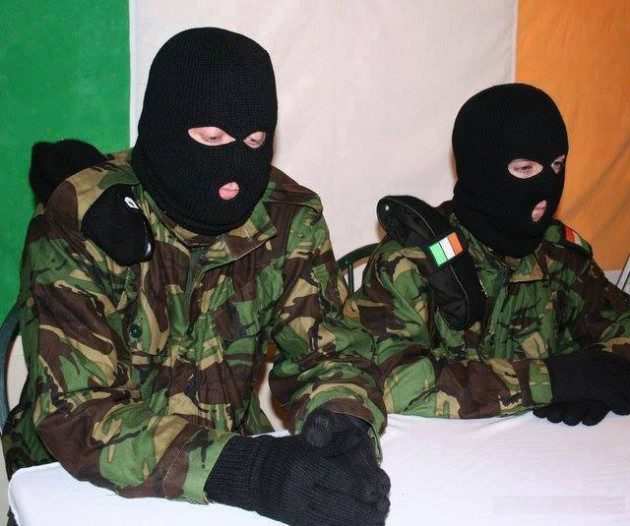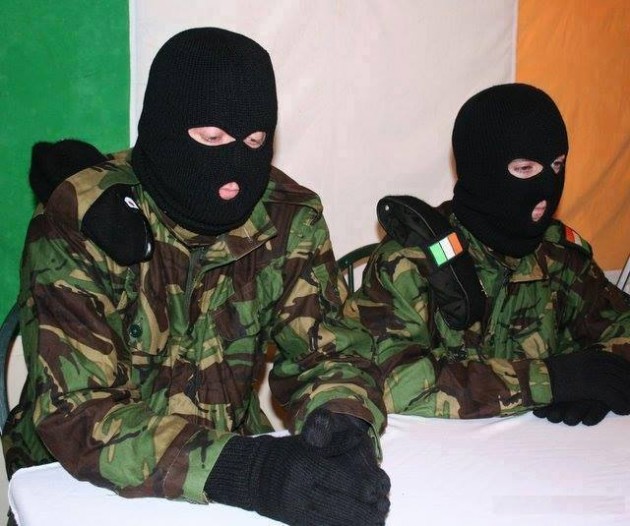La New IRA si è assunta la responsabilità per le due lettere bomba indirizzate alle guardie carcerarie della prigione di Maghaberry e ha minacciato ulteriori attacchi
Il gruppo repubblicano New IRA, formato nel 2012 dall’unione tra la Real IRA, il gruppo Republican Action Against Drugs e repubblicani indipendenti del Mid Ulster, è anche responsabile per l’assassinio della guardia carceraria David Black avvenuto a novembre 2012.
In una dichiarazione, fornita con una parola in codice corretta, la New IRA ha detto che i prigionieri repubblicani sono soggetti “a degradazione e tortura” all’interno della prigione di Maghaberry e l’omicidio di David Black è stato “un avvertimento che non è stato seguito”.
“Le ulteriori morti di personale carcerario sono inevitabili se non verrà risolta la situazione a Maghhaberry”, ha detto la New IRA.
Il gruppo ha annunciato di essere responsabile per le due lettere bomba indirizzate a ufficiali penitenziari di Maghaberry, spiegando che “devono essere immediatamente rimossi da Roe House – l’ala in cui sono detenuti i POW repubblicani – o affronteranno azioni dirette contro di loro sia all’interno che all’esterno del carcere”.
“L’IRA ha a disposizione informazioni di intelligence, capacità, armi e volontari per intraprendere ulteriori azioni contro il personale e la dirigenza penitenziaria” prosegue la dichiarazione.
Nel frattempo, The Irish News ha appreso che le due lettere esplosive sono state inviate dalla stessa casella postale alla periferia della città di Derry. Gli artificieri dell’esercito britannico sono stati chiamati in azione giovedì e venerdì, quando le lettere indirizzate a guardie carcerarie in servizio a Maghaberry hanno suscitato sospetti nel personale degli uffici di smistamento di Great James Street a Derry e a Lisburn.
Entrambe le lettere – che contenevano ordigni in grado di esplodere – sono state inviate da Woodlands, nella periferia nord di Dery, nei pressi del confine con la Contea di Donegal.
La cassetta postale di Woodlands, affermano alcune fonti, sarebbe stata utilizzata per la sua vicinanza con il confine e per motivi legali.
Si ritiene che sia stato scelto Woodlands perché non c’erano telecamere a circuito chiuso nei pressi della cassetta.
“Molte altre cassette postali si trovano in zone ben coperte dalle telecamere a circuito chiuso, quindi i responsabili sarebbero stati ripresi dalla telecamera” ha detto una fonte all’Irish News.
“Questo dimostra la spregiudicatezza di coloro che sono dietro l’attacco. Erano disposti a far trasportare al personale della posta meteriale pericoloso da Culmore [vicino a Woodlands] fino all’ufficio smistamento”.
L’ utilizzo di una cassetta postale isolata è un’ulteriore prova della nuova ed emergente generazione di repubblicani, tecnicamente più consapevoli rispetto ai loro predecessori.
La scorsa settimana, The Irish News ha rivelato l’uso di droni senza pilota da parte dei servizi di sicurezza, per racciogliere prove contro i repubblicani.
È emerso che le informazioni raccolte dai droni sono state utilizzate nel caso contro il repubblicano di Derry, Tony Taylor.
Taylor, quarantacinquenne di Bishop Street a Derry, è stato condannato dal tribunale di Belfast dopo essersi dichiarato colpevole di possesso di fucile.
Il repubblicano è stato condannato a otto anni di carcere. Dovrà passare 3 anni in prigione e gli altri cinque rilasciato su licenza.
La battaglia per la superiorità tecnica tra i servizi di sicurezza e i repubblicani è in crescita dal 2010, quando agenti altamente qualificati in sorveglianza elettronica sono stati schierati in Irlanda del Nord e a Derry. Gli ufficiali sono tutti membri dello Special Reconnaissance Regimenti (SRR).
The Irish Times, in un rapporto esclusivo di ottobre 2010, rivelò che un distaccamento di ufficiali dell’esercito esperti in operazioni speciali di intelligence furono inviati a Derry.
Fondata nel 2005, la SRR è un’unità di supporto di intelligence per la Special Air Service (SAS) e per altre unità simili all’interno dell’esercito britannico.
Il dispiegamento degli ufficiali a Derry hanno portato ad una serie di successi, bloccando potenziali attacchi, tra cui il fermo di un furgone contenente quattro bombe di mortaio avvenuto a Brandywell, Derry, a marzo 2013.
Grazie a Claire Simpson e Seamus McKinney, The Irish News
Tratto da Seachranaidhe1
‘The further deaths of prison staff is inevitability should the Maghaberry situation not be resolved – ‘IRA’.
THE ‘IRA’ has claimed responsibility for two letter bombs addressed to prison officers at Maghaberry jail and has warned of further attacks.
The dissident republican group, which was formed in 2012 after a merger of the Real IRA, North-West-Based Republican Action Against Drugs and independent republicans from Mid Ulster, was behind the murder of prison officer David Black in November 2012.
In a statement, using a recognised codeword, the ‘IRA’ stated that republican prisoners were subject to “degradation and torture” within the jail and said Mr Blacks murder was a “warning that has not been heeded”.
“The further deaths of prison staff is an inevitability should the Maghaberry situation not to be resolved,” it said.
The group claimed it was behind two letter bombs addressed to prison officers at Maghaberry and said they (the prison officers) “must be removed from Roe House immediately or face direct action from either inside or outside the jail”.
“The IRA has the intelligence, capability, weaponry and volunteers at its disposal to take further actions against prison staff and management,” the statement said. “We will not be found wanting in that regard.”
Meanwhile, The Irish News has learned the two letter bombs were sent from the same post box on the outskirts of Derry city. British army bomb-disposal experts were called in on Thursday and Friday when letters addressed to serving Maghaberry prison officers aroused the suspicions of postal staff at Derry’s Great James Street and Lisburn sorting offices.
Both letters – which were subsequently found to contain viable devices – were posted at Woodlands on the northern outskirts of Derry, close to the border with Co Donegal.
Sources have said police believed the Woodlands postal box was used because of its proximity to the border and for forensic reasons.
It is believed Woodlands was also used because those posting the letters would not be caught on CCTV cameras.
“Many other letter boxes are in areas which are well covered by CCTV and therefore they would have been caught on camera,” a source told The Irish News.
“This shows the ruthlessness of those behind the attack. They were willing to let postal workers carry highly dangerous material from Culmore [ adjacent to Woodlands ] into the sorting office.”
The use of an isolated post box is further evidence of a new and emerging generation of dissident republicans who are technically more aware than their predecessors.
Last week, The Irish News revealed security services used unmanned aerial drones to collect evidence against dissident republicans.
It emerged that intelligence collected by drones was used in the case against Derry republican Tony Taylor.
Taylor, (45) from Derry’s Bishop Street, was sentenced at Belfast Crown Court after pleading guilty to possession of a rifle in August 2011.
He was sentenced to eight years in prison, with three years to be spent in custody and five on licence.
The battle for technical superiority between the security services and dissident republicans has been growing since 2010 when officers highly trained in electronic surveilliance were deployed into the North of Ireland and in Derry. The officers are all members of the Special Reconnaissance Regiment (SRR).
In an exclusive report in October 2010, The Irish News revealed a detachment of army intelligence special operations officers were sent to the city (Derry).
Established in 2005, the SRR, is an intelligence support unit for the Special Air Service (SAS) and other similar units within the British military.
The officers’ deployment in Derry has resulted in a number of spectacular successess in the city since 2010. They have included the interception of attacks, including the forced stop of a van containing four primed mortars in Derry’s Brandywell in March of last year.
With many thanks to: Claire Simpson and Seamus McKinney, The Irish News.

